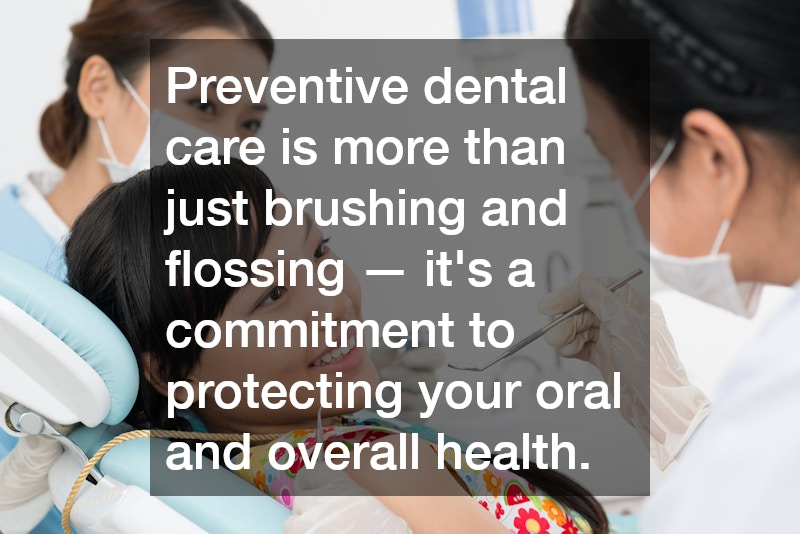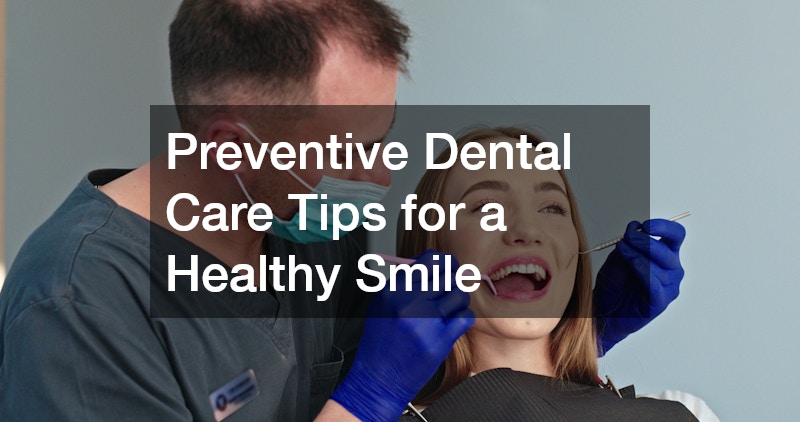Preventive Dental Care Tips for a Healthy Smile
A bright, healthy smile begins with consistent preventive dental care — the foundation of lifelong oral health. Preventive dentistry focuses on avoiding dental issues before they occur through daily habits, regular checkups, and healthy lifestyle choices. This guide explores essential tips for maintaining strong teeth, healthy gums, and lasting confidence in your smile.
How Often Should You Visit the Dentist for Optimal Oral Health?
Regular dental visits are the cornerstone of preventive dental care. Seeing your dentist at least twice a year helps detect early signs of cavities, gum disease, and other oral issues that may not cause immediate discomfort.
Routine checkups allow dentists to identify potential problems early and provide professional cleanings that remove plaque buildup brushing can’t reach. Preventive visits are key to saving both money and discomfort down the road.
Signs That Indicate You Need a Dental Visit
If you notice bleeding gums, persistent bad breath, tooth sensitivity, or jaw pain, schedule an appointment immediately. These symptoms could indicate gum disease, cavities, or other underlying issues that need attention.
Finding a Dentist That Meets Your Needs
Choose a dentist who prioritizes patient education and preventive strategies. A trusted provider will help you develop a proactive oral care plan tailored to your needs.
What to Expect During a Routine Dental Examination
A preventive dental visit typically includes a professional cleaning, X-rays, and a thorough examination of your teeth and gums. Your dentist will check for early signs of decay, assess bite alignment, and discuss oral hygiene habits.
What Daily Oral Hygiene Practices Are Essential?
Good oral hygiene is the foundation of preventive dental care. Consistency in brushing, flossing, and rinsing ensures your mouth stays clean and protected from harmful bacteria.
Techniques for Brushing Your Teeth Effectively
Brush twice daily for at least two minutes using fluoride toothpaste. Hold the toothbrush at a 45-degree angle to your gums and use gentle circular motions to clean every surface. Replace your toothbrush every three to four months or sooner if the bristles fray.
Flossing: Why and How to Do It Correctly
Flossing removes plaque and food particles from areas your toothbrush can’t reach. Slide the floss gently between teeth, curving it around each tooth to clean below the gumline. Daily flossing prevents cavities and gum inflammation.
The Role of Mouthwash in Oral Hygiene
Antimicrobial or fluoride mouthwash helps kill bacteria, freshens breath, and strengthens enamel. Use it as a supplement — not a substitute — for brushing and flossing.
Importance of Cleaning Your Tongue
The tongue harbors bacteria that can lead to bad breath and plaque buildup. Gently brushing your tongue or using a tongue scraper daily enhances oral freshness and reduces bacteria.
Choosing the Right Dental Products
Opt for dental products that contain fluoride and carry the American Dental Association (ADA) seal of approval. Electric toothbrushes can also improve plaque removal efficiency.
How Does Diet Affect Dental Health?
What you eat directly impacts your oral health. A balanced diet supports strong enamel, healthy gums, and reduced cavity risk.
Foods that Promote Healthy Teeth and Gums
Crunchy fruits and vegetables like apples, carrots, and celery naturally clean teeth and stimulate saliva production. Calcium-rich foods such as yogurt, cheese, and leafy greens strengthen enamel and bone.
Understanding the Impact of Sugar on Oral Health
Sugar fuels bacteria that produce acids, eroding enamel and causing cavities. Limit sugary snacks, sodas, and juices — and rinse with water after consuming them.
Managing Acidic Food and Drink Intake
Acidic foods like citrus, vinegar, and carbonated drinks can weaken enamel. Consume them in moderation and wait 30 minutes before brushing to prevent enamel erosion.
Hydration and Its Importance for Oral Health
Water helps wash away food debris, neutralize acids, and maintain saliva flow — a key defense against cavities. Staying hydrated supports every aspect of preventive dental care.
Effective Home Remedies for Maintaining Oral Health
Natural and at-home remedies can complement your preventive care routine when used safely and consistently.
Benefits of Oil Pulling for Oral Health
Swishing coconut or sesame oil for 10–15 minutes may help reduce bacteria and plaque buildup, though it shouldn’t replace brushing or flossing.
Using Baking Soda Safely for Teeth Whitening
Baking soda is a mild abrasive that can help remove surface stains. Use it occasionally to polish teeth, but avoid overuse to prevent enamel wear.
Salt Water Rinse and Its Oral Health Benefits
A warm salt water rinse soothes inflammation, promotes healing, and reduces bacteria after dental procedures or irritation.
Natural Remedies for Gum Health
Green tea, aloe vera, and clove oil contain anti-inflammatory properties that can support gum health when used as part of a balanced oral care regimen.
Identifying Harmful Habits to Avoid
Avoid smoking, chewing ice, or grinding teeth, as these can damage enamel and irritate gums. Mindful behavior is a vital part of preventive dental care.
Creating a Lifetime of Healthy Smiles
Preventive dental care is more than just brushing and flossing — it’s a commitment to protecting your oral and overall health. By maintaining regular checkups, eating a balanced diet, and practicing mindful oral hygiene, you can prevent major dental problems before they start. With consistency and professional guidance, you’ll not only preserve your smile but also enjoy the lasting benefits of confidence, comfort, and health at every stage of life.





Post Comment